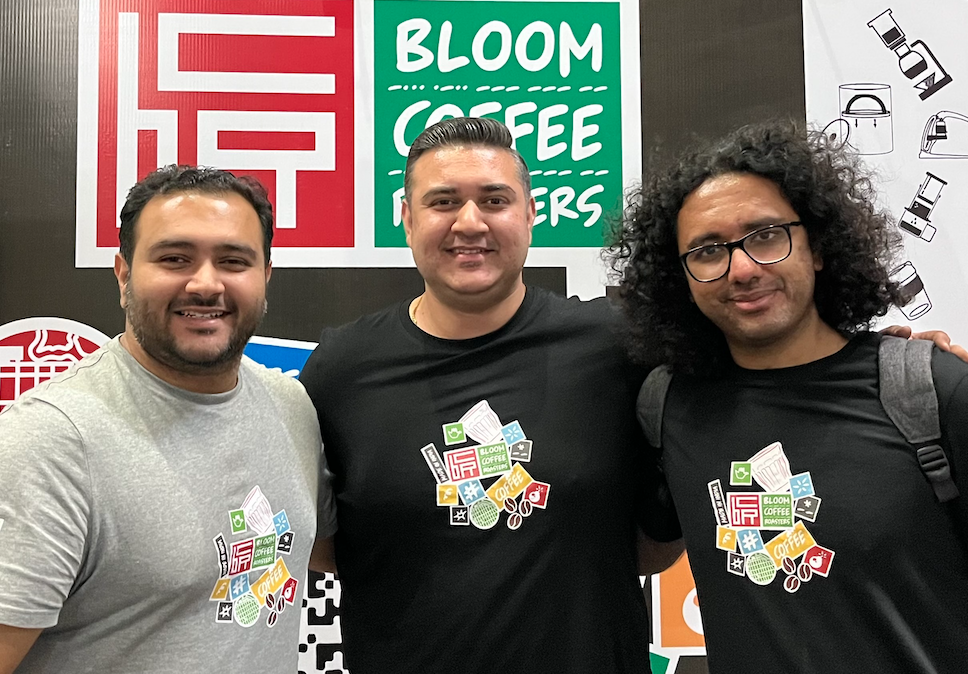Meet Shivansh Sharma, Tejasvi Verma, and Sharang Sharma – the pioneers of specialty coffee in Chandigarh, a developing city in India just north of Delhi.

Shivansh Sharma, Tejasvi Verma, and Sharang Sharma
A business co-owned by the jolly trio, each with their own day jobs but is often awake at four in the morning to roast in their coffee lab, a shared space that is slowly encroaching on their architecture office. Shivansh and Sharang are brothers in arms with an architectural heritage handed down by their grandfather who is still in the business himself. Somewhere along the line, they got their childhood friend Tejasvi to share their obsession for coffee, which gave birth to the now-popular homegrown brand Bloom Coffee Roasters. They desired to build something on their own and found that the coffee scene was more engaging than architecture.
Bloom was the first specialty roaster in town, the best part about diving into the fray was that there was high market accessibility and no sense of inferiority. Conveniently, they had a cousin working as a coffee roaster in the UK that graciously gave them a sample roaster to toy with. They found that roasting calms the mind and is a therapeutic escape from their daily drudgery.
Since then, the community has been appreciative and nothing short of supportive for local Indian coffees embracing quality. Bloom is a momentum to taste is more than just flavor, it is their identity as roasters to act as a conduit to the origin of the coffees.
“Our motto is that specialty coffee is for everyone. We are trying to break the stigma of sobriety and to share good, locally grown coffees in our hometown.”
After working with more than 50 cafes all over India, they found that baristas were often underequipped and not well-trained. In some establishments, baristas doubled as service staff and even food handlers. The trio took the liberty to train their client’s baristas to elevate their coffee game.
“Everything dumbs down to how the coffee is prepared. Now that we have a community of baristas properly equipped with a better understanding of how to make good coffee, they are able to take pride in their work and call themselves baristas.”
India has one of the lowest wages for baristas and SCA certification costs are unrealistic. Bloom tries to provide means to provide support as a community. By building stronger business interests in coffee and the supply chain, they are determined to place baristas at the forefront of the industry. The “Befriend your barista” campaign was designed to instigate interaction between baristas and consumers to highlight the importance of knowing who the stakeholders behind the coffee-making process are.
“Word spreads like wildfire in a small town like ours. A micro-community helps spread word of mouth and we’ve seen first-hand how people go crazy over specialty.”
Instead of focusing on certification, they encourage an emphasis on refining workforce skills, which in turn will raise the overall standards of coffee across the board. They believe that it is important to appreciate the effort invested into producing a good cup of coffee, especially at the farm level. In the foreseeable future, Bloom is looking to construct a training center for baristas to access a training curriculum in order to develop a pathway for opportunities for those looking to enter the industry.
As roasters, they aspire to make specialty coffee affordable and accessible. They discourage new entrants to buy fancy equipment and attempting to master world-class brewing techniques, instead, they recommend consumers to start out with basic gear that is versatile and convenient like a French press.
While India is infamous for its traditional farming practices, the new generation of producers has expanded their horizons abroad, adopting contemporary processing techniques as they work towards improving the quality of their coffees by upgrading infrastructure and incorporating sustainable water treatment and irrigation techniques.
The team makes regular trips to meet with their partnering producers to understand their struggles at the farm. By employing their professional expertise, they are able to innovate structural functionalities to improve harvesting workflow, damage control, and consistency in processing. A big issue that Indian producers face is the erratic weather patterns which could gravely disrupt the quality of crops. As such, the savants contribute by improvising low-cost drying domes that would allow farmers to dry their coffees without worries, especially during the monsoon season; mostly manufactured with recycled materials that are commonly found in the region such as bamboo.
“We want to make coffee fun, playful, and unassuming. We’re from Punjab, where if you take things too seriously, people will throw you out.”
While Bloom Coffee Roasters are earnest about their product, they are joyous individuals – jesting at any chance they get, even integrating witty humour into their work. This is visible in their coffees which are named after some of their favorite artists and even punny at times, the retail bags are also plastered with vibrant stickers inspired by the city’s architecture.


